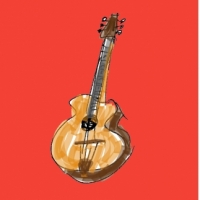DjangoBooks.com
Welcome to our Community!
Categories
- 20K All Categories
- 1.1K General
- 481 Welcome
- 59 Archtop Eddy's Corner
- 146 CD, DVD, and Concert Reviews
- 385 FAQ
- 26 Gypsy Jazz Italia
- 27 Photos
- 208 Gypsy Picking
- 21 Unaccompanied Django
- 15 Pearl Django Play-Along Vol.1
- 17 Gypsy Fire
- 45 Gypsy Rhythm
- 1.4K Gypsy Jazz University - Get Educated
- 131 Gypsy Jazz 101
- 230 Repertoire
- 226 History
- 709 Technique
- 51 Licks and Patterns
- 6 Daniel Givone Manouche Guitare Method Users Group
- 20 Eddie Lang Club
- 1.3K Gypsy Jazz Gear
- 811 Guitars, Strings, Picks, Amps, Pickups and Other Accessories
- 463 Classifieds
- 50 Recording
- 62 Other Instruments
- 18 Violin
- 5 Mandolin
- 22 Accordion
- 7 Bass
- 10 Woodwinds
- 351 Gypsy Jazz Events
- 144 North America
- 112 Europe
- 95 International
In this Discussion
Who's Online (0)
Undiscovered resources
I have just the discovered “The Jazz Standards” by Ted Gioia (I wouldn’t like to try to pronounce that surname!). What a fabulous find. I am enjoying this so much. I’m learning loads and the listening guide at the end of each song description is invaluable.
Every now and then we all find something that has this affect on us. This book has been out for sometime and whenever this happens I’m always left wondering what else is out there that has not come to my attention. I could have been enjoying this book years ago.
So I thought folks might like to share similiar finds. Doesnt need to be a book.
I’ll add to the list by including Denis Changs free backing tracks on DC music school. The quality is great and cos there in sound slice you can alter tempos, select any number of chords to repeat etc. Wonderful!














Comments
Thanx for the tip, I just ordered a copy!
Indeed Twang, The Jazz Standards is a remarkable book. It's one of the few books on the tiny built-in bookshelf in my bedroom, and I go to it for fun & information regularly. It's so enjoyable to me to read about the history of the songs. In fact, the spirit of that book is what really inspired me to revive the Song Of The Month on this forum. Thanks for spreading the word.
The Practice of Practice (https://www.amazon.com/Practice-Boost-Your-Music-Skills/dp/145640797X) is great. Besides having a ton of practical advice, it talks a lot about, what else, practice. So it was fun to read how top musicians practice and how they think about practice. But the best of all, helped me by largely removing the supernaturally gifted musician myth. It showed the enormous amount of work all those believed to be natural prodigies have put it. So it really made it easy to remove the self doubts, stop worrying and thinking about the talent or lack of it. Instead just plow.
I bought your book Buco so I'll let you know how I get on with it. Might be a while.
Thanks for the tip. I am currently listening to it on Audible.
Out of curiosity I bought New Orleans Trumpet because I thought some stuff may be applicable to guitar. I don't play trumpet (although I started clarinet recently 😊). I was pleasantly surprised how valuable the information inside was form me. Not only improvising is discussed, the author also talks about how to handle sit-ins, tips for on the job, duties of a bandleader, etc.
I very much enjoyed it.
"The Gershwins and Me" by Michael Feinstein. Thoroughly enjoyable book tracing the history of the Gershwins as seen through the eyes of Michael Feinstein, who became Ira Gershwin's personal assistant towards the end of Ira's life, almost by accident. Fascinating seeing into the musical world that surrounded the Gershwins in the 20s & 30s as they wrote some of the most enduring songs of all time. Lots of photos of things like the original scrawled lyrics to "I Got Rhythm" and the first notation of "I Loves You Porgy", for example. Feinstein is a really engaging writer.
Dick Hyman's All the Right Changes and Professional Chord Changes and Substitutions. These are two separate books. While I try not to rely too much on charts, these are great books that have good ideas for changes. They were recommended to me by some really great jazz players I had the privilege of playing with and are worth while to have. Pro note would be to go to a print services shop, cut off the binding, and replace with spiral or comb-type binding to make it easier to navigate.
Also, the Beatles Complete Chord Songbook. Most people dig the Beatles. I use this when I'm in a rut or if I want to try to work out chord melodies or just play Beatles tunes. It's simple but really fun.
I have just the discovered “The Jazz Standards” by Ted Gioia
I also enjoyed his History of Jazz (though my edition only has 2 pages on Django and QHCF)
He talks about it here:
Kenny Werner’s 1998 “Effortless Mastery”.
Lots of websites offering it for free if you google it…
Edgar Degas: "Only when he no longer knows what he is doing does the painter do good things.... To draw, you must close your eyes and sing."
Georges Braque: "In art there is only one thing that counts: the bit that can’t be explained."